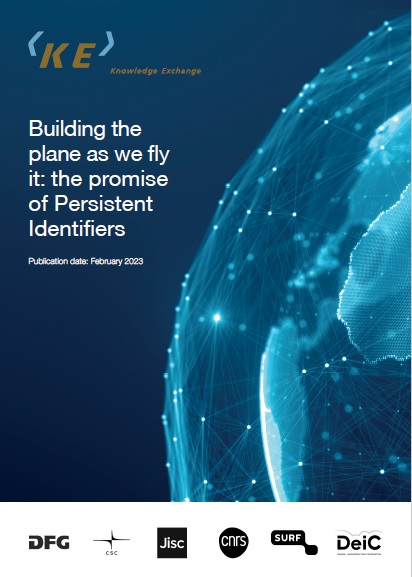
Some 16 months after the Thu Sep 23rd, 2021 kick-off meeting for the “Risks and Trust in pursuit of a well-functioning Persistent Identifier infrastructure for research” project by the Knowledge Exchange, the bulk of its outcomes have now been published. This includes a report (“Building the plane as we fly it: the promise of Persistent Identifiers”) and seven case studies on author IDs, organisational IDs, PIDs for research instruments and facilities, IGSNs, RePEc IDs, failed PIDs and the role of research funders in the consolidation of the PID landscape. A full list of these outputs is included below together with the links to their Zenodo records.
The case study on the role of funders was actually released end-of-Nov 2022 as a teaser publication. This allowed the case study to be discussed at the Autumn 2022 euroCRIS membership meeting in Nijmegen (Netherlands) following a presentation by Maria Cruz from the NWO/Dutch Research Council.
Report:
Building the plane as we fly it: the promise of Persistent Identifiers, https://zenodo.org/record/7258286
Case studies:
Adoption of the DAI in the Netherlands and subsequent superseding by ORCID/ISNI, https://zenodo.org/record/7327505
The gradual implementation of organisational identifiers (OrgIDs), https://zenodo.org/record/7327535
Persistent identifiers for research instruments and facilities: an emerging PID domain in need of coordination, https://zenodo.org/record/7330372
IGSN – building and expanding a community-driven PID system, https://zenodo.org/record/7330498
RePEc Author Service: An established community-driven PID, https://zenodo.org/record/7330516
Failed PIDs and unreliable PID implementations, https://zenodo.org/record/7330527
The role of research funders in the consolidation of the PID landscape, https://zenodo.org/record/7258210
There is too much information in all these documents for it to be summarised in a few lines here but each of them has an abstract in the appropriate Zenodo record. The full report also has an executive summary and – critically – a series of recommendations for a whole range of stakeholders that constitutes one of the main outcomes of the project.
While being aware that the work conducted by a small team of consultants cannot be compared to the wide-ranging analysis carried out by a EU-funded project consortium, we are hoping this collection of outputs may represent a worthwhile follow-up to the comprehensive work in the domain of PIDs done by the FREYA project (“Connected Open Identifiers for Discovery, Access and Use of Research Resources”, Dec 2017-Nov 2020). A wealth of other initiatives in the PID area are highlighted in the various Knowledge Exchange project documents listed above. We hope this work will mean a drive towards a better coordination across the many stakeholders working in the domain.
For us the publication of the project results only marks the end of a phase of our work and the start of a new one: now it’s the turn of the dissemination activities. The Knowledge Exchange being a collaborative network of six European countries, we wanted the project outcomes to be first presented at some event in Europe. As part of a last-minute arrangement for which we must acknowledge here the friendly collaboration of Christian Hauschke, Sabina Auhunas and the rest of the BMBF-funded TAPIR project team at TIB Hannover and the University of Osnabrück, the first presentation of this KE project on PIDs after the release of its main results will be held next Mon Feb 6th. This will be closely followed by a Tue Feb 14th session devoted to this study within the NISO Plus 2023 conference in the United States, please see the details for both activities below. A number of additional dissemination activities will follow in the forthcoming months – including a specific webinar to be held by the Knowledge Exchange in March or April – that will be duly shared via social media.
At this point we wanted to thank the Knowledge Exchange PID Task & Finish Group for their support in the discussions that led to these project outputs, and especially to Bas Cordewener (KE/Jisc), Josefine Nordling (CSC) and Frank Manista (Jisc) as coordinators for the group. A special thanks are also due to Priscilla Dibble at Jisc who has indefatigably dealt with the ‘last push’ to get this work over the line.
Forthcoming dissemination activities for the Knowledge Exchange “PIDs: risks and trust-related issues” project
Mon Feb 6th. Presentation at the TAPIR (“TeilAutomatisiertes Persistent-Identifier-basiertes Reporting”) end-of-project workshop at TIB Hannover (10:00-15:15 CET). 15-min talk “PIDs – Risiken, problematische Implementierungen und Empfehlungen” (“PIDs: risks, problematic implementations and recommendations”) by Ulrich Herb
Tue Feb 14th. NISO Plus 2023 11:00am – 12:15pm EST (16:00-17:15 CET) session “Risks and Trust in Pursuit of a Well-functioning Persistent Identifier Infrastructure for Research” chaired by Gaëlle Béquet (ISSN International Centre). Three short presentations by Ulrich Herb (scidecode), Jessica Parland-von Essen (CSC) and Pablo de Castro (U Strathclyde/scidecode) will be followed by a discussion with the audience.
Note.- All the above-mentioned KE PID project outputs may be found in the scidecode community in Zenodo, https://zenodo.org/communities/scidecode/search?page=1&size=20, which also contains additional scidecode publications. Forthcoming KE PID project presentations will be added into this collection as they are delivered.
- Choosing a data sample provider for our study on the impact of Plan S - 22. January 2024
- Scidecode to explore the impact of Plan S - 6. October 2023
- “At present Wikidata ID is the most suitable ID for organisations in terms of coverage” - 22. May 2023